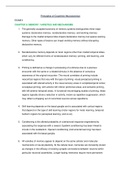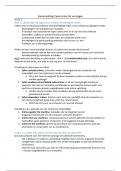Principles of Cognitive Neuroscience
EXAM 2
CHAPTER 8: MEMORY: VARIETIES AND MECHANISMS
1. The generally accepted taxonomy of memory systems distinguishes three major
systems: declarative memory, nondeclarative memory, and working memory.
Damage to the medial temporal lobe impairs declarative memory but spares working
memory. Other types of lesions can impair working memory without disrupting
declarative memory.
2. Nondeclarative memory depends on brain regions other than medial temporal lobes,
which vary for different forms of nondeclarative memory: priming, skill learning, and
conditioning.
3. Priming is defined as a change in processing of a stimulus due to a previous
encounter with the same or a related stimulus in the absence of conscious
awareness of the original encounter. The neural correlates of priming include
neocortical regions that vary with the type of priming: visual perceptual priming is
associated with altered activity in the visual sensory areas in occipitotemporal cortex;
conceptual priming, with anterior left inferior prefrontal areas; and semantic priming,
with left anterior temporal areas. In functional neuroimaging studies of priming, these
regions typically show a reduction in activity, known as repetition suppression, which
may reflect a dropping out of noncritical neurons across repetitions.
4. Skill learning depends on the basal ganglia and is associated with cortical regions
that depend on the type of skill learning (motor regions for motor learning, temporal
fusiform regions for perceptual learning, and so on).
5. Conditioning is the altered probability of a behavioral response engendered by
associating the response with a reward. Eyeblink conditioning has been linked to
circuits in the cerebellum. Operant conditioning (instrumental learning) has been
associated with the basal ganglia.
6. All varieties of memory appear to depend on the same cellular and molecular
mechanisms of neural plasticity. At the cellular level, memories are transiently stored
as changes in the efficacy of existing synaptic connections between neurons within
particular neuronal assemblies. Longer-lasting memories require more permanent
, changes in gene expression, protein synthesis, and morphology, including the
formation of new synaptic connections.
Digit-span task: A working memory test in which the subject is asked to immediately recall a
random string of numbers, which is gradually increased until recall fails.
Mirror drawing task: A sensorimotor skill learning task in which the subject is asked to trace
the outline of a figure, such as a star, which can be only seen through its reflection on a
mirror. Accuracy improves gradually with practice.
Memory: Processes by which information is encoded (learned), stored, and retrieved.
Encoding: Also called learning. The incorporation of new information into a memory store,
which requires the modification or creation of memory traces.
Storage: The retention of information over time.
Retrieval: The recovery or accessing of stored memory traces.
Learning: The combined effect of all encoding, storage, and retrieval in gradually enhancing
the performance of a particular task.
Working memory: Memory held briefly in the mind that enables completion of a particular
task (e.g., efficiently searching a room for a lost object).
Declarative memory: Also called explicit memory. Memory available to consciousness that
can be expressed by language.
Nondeclarative memory: Also called implicit memory. Memory expressed through
performance; assumed to operate unconsciously.
Amnesia: The pathological inability to remember or to establish memories.
Childhood amnesia: Also called pediatric amnesia. In adults, the inability to remember the
early years of childhood.
Anterograde amnesia: The inability to lay down new memories.
Retrograde amnesia: The inability to recall memories for events that happened before the
lesion or brain disorder that caused the memory loss.
, Priming: Facilitated processing of a particular stimulus based on previous encounters with
the same or a related stimulus.
Skill learning: Gradual improvement in the performance of a motor or cognitive task as a
result of extensive experience and repeated practice.
Conditioning: The generation of a novel response that is gradually elicited by repeated
pairing of a novel stimulus (the conditioned stimulus) with a stimulus that normally elicits the
response being studied (the unconditioned stimulus).
Direct priming: Also called repetition priming. The facilitation of recall in which the prime and
the target are identical or have the same name.
Indirect priming: The facilitation of recall by an item (the prime) that is not directly related to
that item. For example, the word winter may indirectly prime both summer and snow.
Semantic priming: A form of indirect priming in which the prime and the target are
semantically related.
Perceptual priming: A form of direct priming in which the test cue and the target are
semantically related.
Conceptual priming: A form of direct priming in which the test cue and the target are
semantically related.
Levels of processing: Declarative memory encoding is usually better when information is
processed at a semantic (deep) level rather than at a perceptual (shallow) level.
Repetition suppression: Also called neural priming. A phenomenon observed in functional
neuroimaging studies in which previously encountered stimuli evoke smaller hemodynamic
responses than do novel stimuli.
Sharpening theory: Priming theory which proposes that when a stimulus is repeated neurons
that are not essential fire less, leading to a more efficient “sharpened” representation and a
reduction in neural activity.
Spreading activation: Hypothetical mechanism whereby the activation of a node in the
semantic network spreads to associated nodes.







